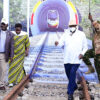Life & Style
The English Language as my Nightmare
Asalaam Alaikum. I’m also chilling a bit here in Mbale at Mount Elgon.
I had just given Master Babalanda the coin necklace, when I heard him insulting some girls that they had “bad manners”. Poor me, Ashraf, ignorant as I was in the English language, I thought that he had obscenely spoken in vernacular.
I ran and waited for the evening parade, to give evidence against a teacher. He was the second teacher to fall victim after Ms. Nabalwanyi, who could not say, kubba ekikalu, in English. In fact, no teacher could; and if you were found with your shirt not tucked in, you would instantly receive a cane on your back.
No teacher would risk the coin when the cane served the purpose. The coin was passed on to a pupil who had failed an English pronunciation, or spelling test, as a punishment.
The canteen women were clever, too; they had devised means of selling their edibles in English. For example, chapatti, I told you was chapaaaaati; samosa was, either Kawo Triangle or Rice Triangle, meaning sumbuusa eya kawo oba eyo mukyeere.
Namungodi, was Rice Football; muwogo omusiike, was Kasavu; Mawogola, was meketus; but it was a bit risky to shout out that: “I want meketu”; for the canteen business was rescued this way.
Meanwhile, at the parade one had to announce the person he gave the coin, what he/she said in vernacular and the English version. But I did not know “manners” in English. So I approached my P.7 auntie, Ziyadda for help.
At least for them, they had studied about the reproductive system. When I asked her what “manners” is in English, the girl could not believe her ears. She even cried that I was a bad boy who wanted to ask girls in English for their “manners”.
That evening at home, Ziyadda yandoopa ewa jjaja nenkubwa bcs nail, “Njagala kutandika kukola bya busiru”. It is Tifu Sali, a friend, who translated the word “manners” for me. The word was vagina.
At last, the evening parade came and the process of lining up the vernacular speakers for the day started. The one who stayed with it for the night came out first; it was usually the one who had it last the previous day.
I remember this boy up to today. He was from Kalunji, Kirerangalo. From Kalunji, there were not many pupil before, Musoke, who gave it to me appeared.
He called me out. I, in turn called out Mr. Babalanda, to the surprise of everybody, for he was a very tough man, leave alone being an English teacher.
The Headmaster asked me to shout out what the teacher had said. But who could shout out such an obscene word before those very many pupils?
I simply called the four girls who the teacher had insulted and humbly told the HM that; “Manster Babalanda said, ‘zat zozi girls haz bad things’.” I shamelessly pointed at their private parts.
Oh! My God. With all the anger and rage, Mr. Babalanda shouted out; “You boy, I said MANNERS.”
I nearly collapsed. Omusajja ayinza atya okutuwemula obwenkanidde awo. The whole assembly went wild; they could not believe what Mr. Babalanda had just said.
The HM got confused and adjourned the parade. Bwentyo kwolwo nempona embooko za English.
More is yet to come. Best regards.
Comments



















